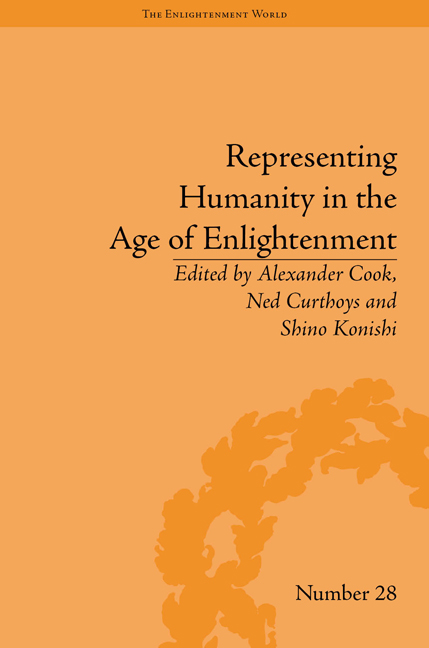Book contents
- Frontmatter
- CONTENTS
- Acknowledgements
- Dedication
- List of Contributors
- List of Figures
- The Science and Politics of Humanity in the Eighteenth Century: An Introduction
- Part I Humanity and the Civilizing Process
- Part II Encountering Humanity
- 6 Songs from the Edge of the World: Enlightenment Perceptions of Khoikhoi and Bushmen Music
- 7 Joshua Reynolds and the Problem of Human Difference
- 8 François Péron's Meditation on Death, Humanity and Savage Society
- 9 Neither Civilized Nor Savage: The Aborigines of Colonial Port Jackson, Through French Eyes, 1802
- 10 The Difficulty of becoming a Civilized Human: Orientalism, Gender and Sociability in Montesquieu's Persian Letters
- Part III The Limits of Humanity
- Notes
- Index
7 - Joshua Reynolds and the Problem of Human Difference
from Part II - Encountering Humanity
- Frontmatter
- CONTENTS
- Acknowledgements
- Dedication
- List of Contributors
- List of Figures
- The Science and Politics of Humanity in the Eighteenth Century: An Introduction
- Part I Humanity and the Civilizing Process
- Part II Encountering Humanity
- 6 Songs from the Edge of the World: Enlightenment Perceptions of Khoikhoi and Bushmen Music
- 7 Joshua Reynolds and the Problem of Human Difference
- 8 François Péron's Meditation on Death, Humanity and Savage Society
- 9 Neither Civilized Nor Savage: The Aborigines of Colonial Port Jackson, Through French Eyes, 1802
- 10 The Difficulty of becoming a Civilized Human: Orientalism, Gender and Sociability in Montesquieu's Persian Letters
- Part III The Limits of Humanity
- Notes
- Index
Summary
For the quarter century from 1765 to 1790 Joshua Reynolds was the most fashionable portrait painter in Britain. He charged the highest prices for his work and had a grander list of patrons than any other artist in the period. As Inaugural President of the Royal Academy, he was also the most influential theorist on the proper methods and uses for art. His fifteen Discourses, delivered as lectures to Academy students during the twenty-one years of his presidential tenure, famously advocated a neoclassical universalist politics. Reynolds urged representations of the ‘general and intellectual’ over the ‘vulgar and strict historical truth’ in order to promote a national ‘refinement of taste’, which in turn would result in the virtuous contemplation of ‘universal … harmony’.
Reynolds's specialist genre of portraiture was, however, an especially fraught medium for the so-called grand style, given its necessary attention to (and typically its financial reliance upon) particular subjects. During the 1770s, Reynolds developed an important clause in his theory to deal with this potential contradiction. Artists could include certain ‘single features’ if they were minor or ‘innocent’ enough to provoke neither ‘disquisition nor any endeavour to alter them’. To illustrate, Reynolds gave the examples of a Cherokee and a Tahitian.
- Type
- Chapter
- Information
- Representing Humanity in the Age of Enlightenment , pp. 95 - 108Publisher: Pickering & ChattoFirst published in: 2014



